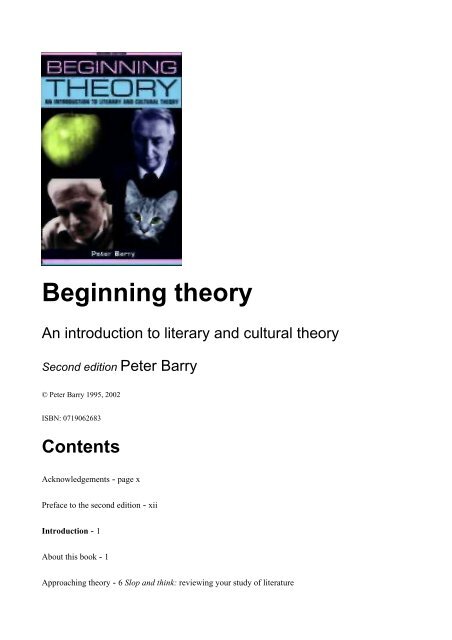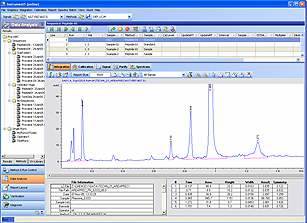Rivkin And Ryan Literary Theory An Anthology Pdf

Untitled DocumentENGL 511.01 (3 crs)Studies in Literary Criticism: Contemporary Critical Theory & PracticeDr. Stephan Flores (sflores@uidaho.edu)Class meets 9:30 am - 10:45 am TR REN 1; 885-6147Office hours: MW 1:00-2:00 p.m.
Literary Theory: An Anthology 3rd Edition by Julie Rivkin; Michael Ryan and Publisher Wiley-Blackwell. Save up to 80% by choosing the eTextbook option for ISBN: 384,. The print version of this textbook is ISBN: 852,. Julie Rivkin is Professor of English at Connecticut College, USA, where she teaches on American literature, contemporary women writers, and literary theory. She is the author of False Positions: The Representational Logics of Henry James’s Fiction (1996). With Michael Ryan, she is the author of Literary Theory: A Practical Introduction(Wiley Blackwell, 3rd edition, 2016).
315 CommonsThis course ventures into contemporary critical theory (including attention to selected “precursors”) with focused study of post-structuralism(s) and material cultural analysis, particularly deconstruction, psychoanalytic theory, Marxism, feminism and gender analyses, and historical contexts for interpretation. These perspectives engage with relations among desire, power, history, representation (particularly the figurative turns of language), texts and identities. We’ll explore several short stories by James and Wharton with selected secondary criticism —these narratives, together with the theoretical texts—complement one another, and provide occasions for inquiry/analysis as we develop an understanding of theory in literary and cultural studies. Jonathan Culler states 'there is no determining in advance what might count as relevant, what enlarging of context might be able to shift what we regard as the meaning of a text. Meaning is context-bound, but context is boundless,” or in the words of Gayatri Chakravorty Spivak: “in every textual production, in the production of every explanation, there is the itinerary of a constantly thwarted desire to make the text explain. What inhabits the prohibited margin of a particular explanation specifies its particular politics.”Texts:Literary Theory: An Anthology. Julie Rivkin and Michael Ryan.
Second edition. (Wiley-Blackwell, 2004)M.A.R. Habib, Modern Literary Criticism and Theory: A History (Wiley-Blackwell, 2008)Short fiction:James, Henry.James, Henry.Wharton, Edith.Wharton, Edith.also seeJames, Henry.James, Henry.James, Henry. Tenwritten Discussion Starters: a thesis/problem-driven, question-posing response(175-200 words) to some aspect of the texts and topics of study and discussion.Discussion Starters present a means for you and the class to share enthusiasmsand doubts as you delve into the text’s significance, methods, and effects.
Nolate entries —Discussion Starters with corresponding texts/due dates noted on schedule below, are due in class (hard copy or copy you can access via laptop, etc.), withDS entries also posted on Blackboard before class (between 7:30pm the night before and no later than 8:30 a.m. The day class meets). Come to class prepared to share/exchange your DSs first in a small group, and thenwe’ll rotate responsibility for putting a spotlight on individual DSs to facilitate discussion. Missing discussion-starter entries (including any missing DS entries on Blackboard, regardless of whether you turned in a hard copy) will be counted against yoursemester grade (see below).2.Two concise Critical Analyses: These CAs will 'occupy'—in a sense—two of the twelve DS due dates noted on the schedule below; CA#1 will be due between Sept. 6 (450-500 words,single-spaced, titled, posted online and with hard copy turned in during class on date that corresponds to the text or texts under discussion—for example, during the week of Sept. 27-29, a good portion of the class may decide to submit one of their ten DSs, while some students may choose to submit CA#1 instead); in like fashion, CA#2 is due between Oct. 15 (450-500 words).
Literary Theory An Anthology Summary

These assignments direct you to explore a significant issue andrhetorical/theoretical strategy/topic that you identify in the text or texts assigned for that day or week. A sharply focusedexplanation and analysis may contain the kernel of a hypothesis that could serve asthe cornerstone or shaping idea for a longer essay, such as the Term Essay. Your analysis can be quite'thesis-driven'—that is, you may find it effective to compose athesis for your response that maps out for readers the engaging, importantpoints that you want to develop—or you may prefer a more reflective,question and problem-posing approach.3. Theory Essay 1, that demonstrates your developing understanding of the significance and contours of explanation and argument and concepts of one or more of the texts under study up to the due date ( 1800 words for body of essay, approximately 6.5-8 pp., excluding Works Cited page, double-spaced, 12 pt,Times New Roman, 1-inch margins, MLA format). What is the philosophical value/utility of the theory/concepts (perhaps in relation to some other or prior perspective, theory/concept). What argument and point of view (what is at stake) forms the theory and elicits or prompts your essay? What assumptions and practices get called into question by the theory/concept?
In general terms for any critical essays, see these views and advice:4. Theory Essay 2: 3000+ words for body of essay (approximately 11+ pp., excluding Works Cited page), double-spaced, 12 pt,Times New Roman, 1-inch margins, MLA format). This critical essay develops ideas prompted by our study,discussion, by recent scholarship, and by your perspectives. I shall attend tothe ways that you select, define, and engage questions and contradictions, andto the clarity, imagination, and grace that you demonstrate in presenting yourtopic, (hypo)thesis, and argument, and the extent to which your work engageswith, explains, and contributes to the larger 'conversation' ofscholarship/history on the topic and text or question under analysis. I do not alwaysexpect essays to conclude by 'solving' such problems or by'proving' your thesis; I hope that you address interesting topics(questions for debate, interpretation, and analysis) in thoughtful and usefulways. Note: You may draw upon and revisematerial from prior written work (DS entries or Critical Analyses) to form part of this essay; but you maynot, for example, cobble together two or three assignments to form this largerassignment or draw substantially upon your text from Theory Essay 1. Theory Essay 2 must embody and represent additional work to asubstantial degree.

Please feel invited to confer with me during the writing process.5.Participation: Please take advantage of opportunities to share your insightsand to listen and reply to others' ideas. I hope that questions anddiscussions will enable you to move the class in directions you find mosthelpful, give you opportunities to develop critical skills throughcollaboration, and provide for a productive, interesting exchange of perspectivesamong the class. I may form small groups, primarily for sharingDiscussion-Starters (as noted above). Students should also be prepared to enter into and perhaps facilitate discussion on the days that they submit each of the Critical Analyses.6.All required work is due as specified on the due date—workturned in late will be graded accordingly. Required graded written work willbe downgraded one notch (for example, B+ to B, converted to points for eachassignment) for each weekday late (not just days classes meet but counting justone day for a weekend). Work submitted more than a week late will not beaccepted.
I will grant short extensions for medical and familyemergencies—but talk with me as soon as possible to request an extension.Always keep copies of your work.7.Attendance: If you have no absences by the semester's end (excused or not),you will receive four bonus points; with only one absence you will receivethree bonus points. Two absences will not affect your semester grade; a thirdabsence will lower your semester total by six points, with a six-pointreduction for each additional absence (four absences=minus 12 points, fiveabsences = minus 18 points); six or more absences is sufficient cause for you to receive a failing grade for the course, regardless of your semester point total. All absences will becounted—excused or not—if something extraordinary occurs, talk tome.8.Grades: Critical Analysis #1 (30 pts); Critical Analysis #2 (30 pts); Theory Essay 1 (100 pts); Theory Essay 2 (130 pts). Theserequired assignments add up to a maximum of 290 points. Thus 261-290 pointsequals an A, 232-260 equals a B, 203-231 equals a C, 174-202 equals a D, andanything below 174 equals an F. I shall also reserve a potential five bonuspoints based on my perceptions of the strength of your participation andefforts over the semester; in addition, incomplete or insufficient Discussion-Starterentries will be counted against your semester grade, with the loss of sevenpoints for each missing/late, or incomplete entry, to a maximum loss of 70 points.9.Office hours. I encourage you to confer with me—especially beforeassignments are due—to talk about your interests, intentions, and writingstrategies.
If you cannot make my regular hours (in 315 Commons), we’llarrange another time. I also welcome communicating with you by E-mail(sflores@uidaho.edu).10.Use of laptops and cell phones during class is prohibited, except on days when DSs are due; that is, occasional use oflaptops—typically for group work and to access the online components ofthe class—may be permitted with instructor’s approval.11.Do not submit work for this class that you have submitted or intend to submitfor a grade in another course; as always, be careful to cite anyone else's workthat you draw upon.
The new edition of this bestselling literary theory anthology has been thoroughly updated to include influential texts from innovative new areas, including disability studies, eco-criticism, and ethics. Covers all the major schools and methods that make up the dynamic field of literary theory, from Formalism to Postcolonialism.
Expanded to include work from Stuart Hall, Sara Ahmed, and Lauren Berlant. Pedagogically enhanced with detailed editorial introductions and a comprehensive glossary of terms. Julie Rivkin is Professor of English at Connecticut College, USA, where she teaches on American literature, contemporary women writers, and literary theory. She is the author of False Positions: The Representational Logics of Henry James’s Fiction (1996). With Michael Ryan, she is the author of Literary Theory: A Practical Introduction(Wiley Blackwell, 3rd edition, 2016).Michael Ryan is Professor of Film and Media Arts at Temple University, USA. He is the author of several books, two novels, and co-editor of the journal Politics and Culture. With Julie Rivkin, he is the author of Literary Theory: A Practical Introduction (Wiley Blackwell, 3rd edition, 2016).